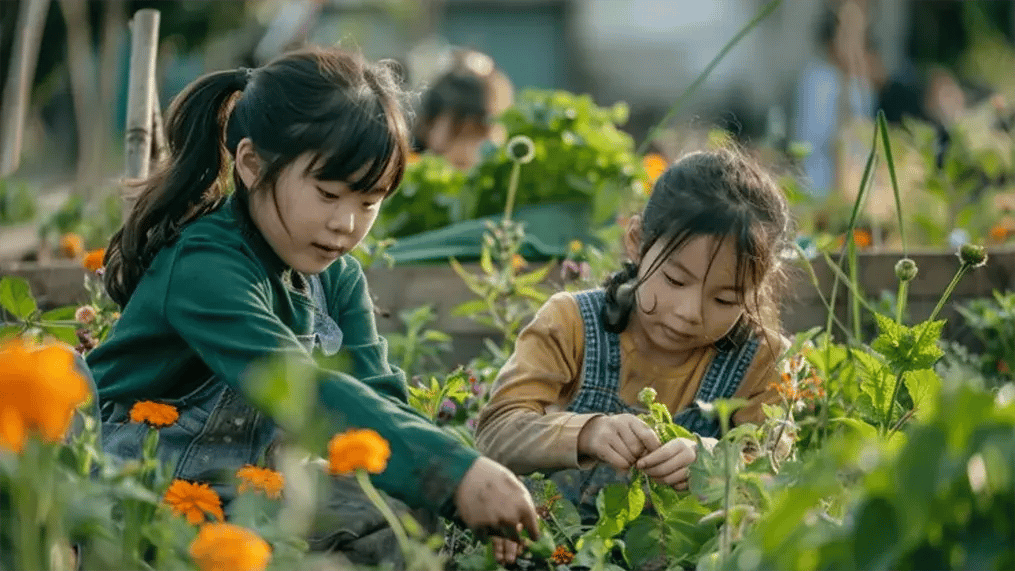- Improves Mood
- Induces Mindfulness
- Builds Confidence
- Enhances Bonding
- Develops Empathy
- Lowers Stress And Anxiety
Introduction
Gardening is the perfect way to unwind in the lap of Mother Nature, away from all the stress of work and studies. Its lush green leaves shelter children from heat and rain while ensuring they remain dry and comfortable and enhancing mood and appetite with its fragrant scents and delicious fruits. With so much to offer in exchange for a little attention and care, gardening has become a wonderful hobby to inculcate multiple healthy values in kids and sort them for life. But more importantly, it offers solace to the minds and hearts of children, who endure multiple stressful factors at school and tuition, like peer pressure, bullying, and academic anxiety. Also, the 21st century has offered lots of technological, medical, and social advancements to humanity, but has considerably lessened leisure and innocence in kids. Most children no longer play outdoors; the little recreation they engage in is usually restricted to smart devices, which often act as anxiety triggers and mindless entertainment. To avoid such fruitless pleasures, it is ideal to engage kids in gardening and watch their minds heal and grow. But what is the connection between gardening and children’s emotional health? Here’s a quick guide to it.
Gardening And Children’s Mental Wellbeing - The Connection

Gardening and your child’s mental and emotional health are connected due to the former’s following benefits.
-
Improves Mood
Gardening makes kids feel more focused and content with themselves. It takes their mind off their anxieties and grounds them in the serene, present moment. Also, since gardening involves physical movement and activity, it also boosts the secretion of mood-enhancing endorphins in young kids, improving their emotional health.
-
Induces Mindfulness
Since gardening is an anchor for the present, it chases all worries from your kid’s mind. They remain focused on the task they are doing, improving their attention span and enjoying and savoring precious peace and free time.
-
Builds Confidence
It is difficult to take care of plants, water them, trim them, and ensure the soil is nutritious enough, drainage is proper, no pests are attacking, and the plant is healthily growing. If your kid is capable of growing one or more plants, then they should be appreciated for it to enhance their confidence. This is a great way to boost your kid’s emotional and mental well-being in the long run.
-
Enhances Bonding
If your kids are young, then gardening is a wonderful way of bonding with them. Teach them various plants, their scientific and common names, characteristics, benefits, and identification traits. This will improve their relationship with food and healthy food groups like fruits and vegetables as well. Gardening together daily helps kids and parents de-stress together, communicate healthily, and develop a solid, emotional connection with them.
-
Develops Empathy
Gardening helps kids connect better with nature, including all creatures, big and small, be they animals or plants. It makes them kind, sincere, and empathetic, with respect for humans, creatures, and plants. Also, watering and tending to plants daily inculcates responsibility in children, equipping them well to care for someone without expecting anything substantial in return.
-
Lowers Stress And Anxiety
Gardening helps lower various kinds of stress in children, like a small fight with a friend to a big one with a teacher over a class test. Since it enhances their focus on savoring the present moment, it also helps kids let go of uncontrollable worries, letting nature take its course. And since improved mood in the face of adversity increases a child’s resilience and perseverance, gardening benefits kids in the long run as a healthy coping mechanism for negative emotions.
Tips To Inculcate Gardening Into Your Kid’s Day To Improve Emotional Health

- If you live in city apartments, start by growing plants indoors. You can start small, entrusting a succulent or a money plant to your child, which requires little watering. As they grow more responsible, they gradually increase the level of challenge.
- If you own a garden, but your kid does not care much for gardening, take them outdoors with you for at least 10 minutes daily. You can garden while they may play or wander about, but out in the open air, without any smart device. The fresh air will slowly get them into the groove.
- If they can keep a plant alive, slowly assign more plants. Try to let them oversee a variety of plants, herbs, trees, or flowers, as it will increase their knowledge and tenacity to handle different requirements at once.
- Make a nature journal together with your kid. It can be full of labeled images, sketches, stickers, or simply notes, but it will support your kid’s potential interest in natural sciences in the future.
Conclusion

The connection between gardening and children’s emotional and mental well-being is not a difficult code to crack or inculcate. It simply takes some extra patience on the part of the parents, and some diligence from the kids, especially when armed with this handy guide.
Kaushiki Gangully is a content writing specialist with a passion for children's nutrition, education, and well-being. With more than five years of writing experience and a science-based background, she provides nuanced insights to help families raise happy, healthy kids. Kaushiki believes in making learning and healthy eating fun, empowering parents with practical, easy advice.
The views expressed are that of the expert alone.
The information provided in this content is for informational purposes only and should not be considered a substitute for professional medical advice, diagnosis, or treatment. Always seek the advice of your physician or another qualified healthcare provider before making any significant changes to your diet, exercise, or medication routines.










